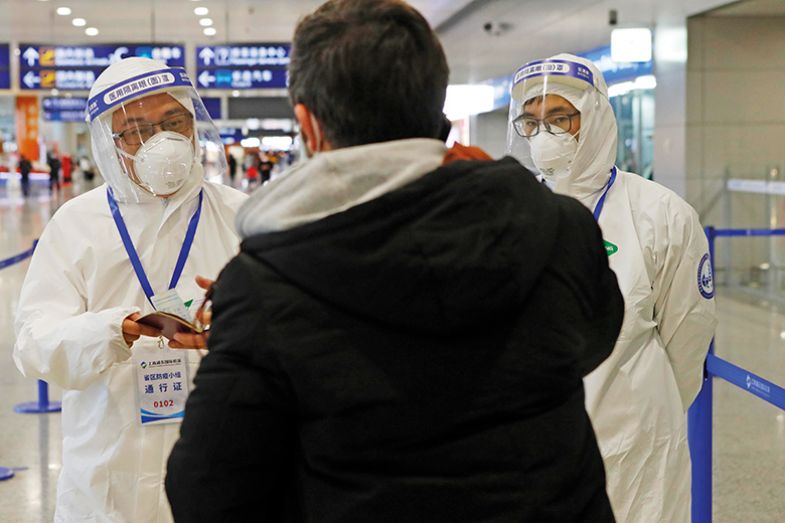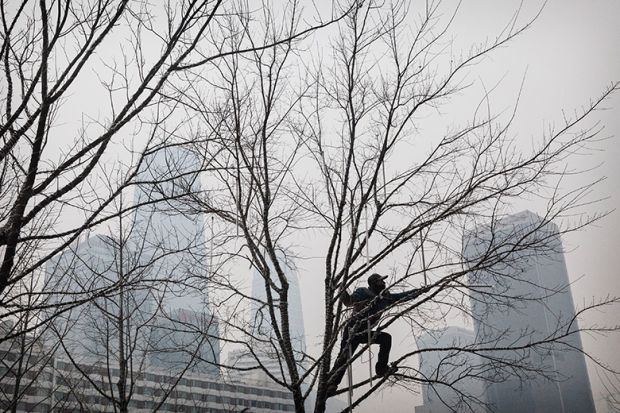International academics who have recently left the UK’s two joint venture universities (JVUs) in China have reported to Times Higher Education increasing conflicts with management, alleging practices that they say are not in keeping with the values of the institutions’ Russell Group partners, the University of Liverpool and the University of Nottingham.
Most departed China amid disagreements involving dismissal, leave or pay that they were unable to resolve through the grievance channels or collective action common in the UK. Those who had lived in China for many years also claimed that there had been a drop-off in standards around academic freedom and freedom of movement since the 2020-21 year, beyond what was required by China’s strict Covid rules.
While all had positive views of the Chinese campuses’ modern facilities and research opportunities, they also spoke of a marked change in the past year that, they claimed, had caused multiple foreign colleagues to leave their schools and departments. They spoke on the record to THE but requested anonymity because of pending complaint cases and security concerns.
The problems began when many foreigners left China in early 2020 at the outbreak of the pandemic. Staff at JVUs said they were under great pressure to return to work in person. Academics who spoke to THE alleged that those who did return were pressured not to leave again to see their families during the 2020 and 2021 summer breaks.
While the cases reported to THE vary by personal circumstance, all had common themes such as constraints on movement, inflexibility for families and a perceived lack of response from human resources departments.
“Naturally, some staff are suffering emotional and psychological stress. Many staff have not seen family, parents and children, or visited their home countries, since the start of 2020,” academics wrote to THE.
One former scholar at the University of Nottingham Ningbo, China (UNNC) told THE that international staff stuck outside the border felt that they were under pressure, even when they continued their teaching, research and administrative duties remotely.
The management “demonstrated both a dereliction of care and a crass disregard for the multiple vulnerabilities faced by foreign academics working in China”, he said.
“My personal advice to anyone considering a job at a Sino-foreign university these days is to think more than twice before taking the offer,” he continued. “They need to understand fully the implications of working in China and the precarity of their position…Recourse to legal assistance and redress is next to non-existent.”
A second UNNC academic said he resigned despite not having another job lined up because he could not face another year separated from his family or the increased censorship. “I had become more and more concerned with the political and social climate in China and how this was seeping into UNNC,” he said.
He noted a major change from his earlier years at UNNC, when he was “mostly free and able to express myself” and felt momentum building in his school. “We had a good thing going. The intellectual dynamism of the school was exceptional, and we were really producing a lot of fantastic work. But then people started to leave, and coupled with the aforementioned tightening of control, the place changed significantly,” he added.
“I am not naive to the challenges of operating a foreign university in China, but I do feel that, whereas there was some wiggle room previously, now this has been shut down,” the academic continued. “The longer I worked, the more I came to realise that UNNC is actually a Chinese university masquerading as a British one.”
“I am still miserable about it,” he added. “I loved my job. I also loved living in China.”

A UNNC spokesperson told THE that “we simply do not recognise any of these allegations” and that staff were able to determine their own leave.
“Whether in China, Malaysia or the UK, we have done everything possible to support our colleagues’ health, employment and research against the undoubted challenges presented by the global pandemic,” the spokesperson said, adding that “UNNC followed (and in many cases exceeded) all legal requirements related to Chinese labour and employment laws.”
Another case involves a former academic at Xi’an Jiaotong-Liverpool University (XJTLU), who told THE that he had left China with his wife and children after years of steady employment there. This happened after the Briton’s stressful encounter with a student – who was coughing and unmasked in a full lecture theatre – snowballed into allegations of racism and into tensions with the management.
After that “incident”, he said, he received a call at home from an administrator who said the university had no choice but to act. “It was quite scary,” the academic said. “They said the police had come, although no officer spoke to me. They said they could only protect me for so long.”
He was advised “in the strongest terms possible to resign” by email, and when he did not respond, his contract was terminated, the academic said.
“It is actually a fantastic university,” he said. “It really grieves me to leave.”
Ultimately, he was unable to fight his case or to find other employment in China, so he took a settlement he said barely covered the cost of flights out. He called the move “extremely difficult practically, emotionally and financially”.
Chris Harris, vice-president of academic affairs at XJTLU, told THE that the institution had 1,500 staff from 50 countries “employed on contracts which fully adhere to legal requirements in China”.
“Although we would not comment publicly about any individual personnel matters, our HR system fully respects individual employment rights and, where appropriate, we would seek out external mediation mechanisms,” he said, adding that the university has “enabled and supported” staff mobility.
He said that staff retention was “strong” and that the exit rate has not been beyond the average market rate despite the pandemic.
“XJTLU places an emphasis on core values that include openness, freedom and fairness, which are consistently reflected both in our academic activities and in our employment practices,” he added.
The academics who left their jobs said they received little help when they appealed to the Chinese institution’s UK partners.
The former XJTLU academic said the UK side, including members of Parliament he had contacted, were not particularly helpful, for example in securing a visa for his non-British wife.
“This is despite the fact that we were really in jeopardy,” he said. “This brings up some human rights issues, like the right to family life, since the family would be separated.”
Another academic, now located in Europe, said “the headquarter university in the UK, to which the Sino-foreign one is effectively a franchise, seems mostly interested in maintaining the revenue stream to its coffers”.
“More and more Chinese students prefer to pursue their dreams for foreign degrees at such Sino-foreign institutions – which only increases their pecuniary value in the eyes of the management boards in the UK and makes overseas staff in China even more vulnerable and precarious, as the headquarters are less willing to do anything that might threaten their profit margins,” he added.
There are about 10 joint venture universities in China, which are partnered mostly with US, UK or Hong Kong institutions. Many offer joint programmes in which Chinese students split their time between domestic and overseas campuses, which can be a revenue source for the foreign partner. China’s Ministry of Education did not respond to an emailed request on the details of these JVUs.
POSTSCRIPT:
Print headline: International scholars drop out of Sino-UK branches
Register to continue
Why register?
- Registration is free and only takes a moment
- Once registered, you can read 3 articles a month
- Sign up for our newsletter
Subscribe
Or subscribe for unlimited access to:
- Unlimited access to news, views, insights & reviews
- Digital editions
- Digital access to THE’s university and college rankings analysis
Already registered or a current subscriber? Login











